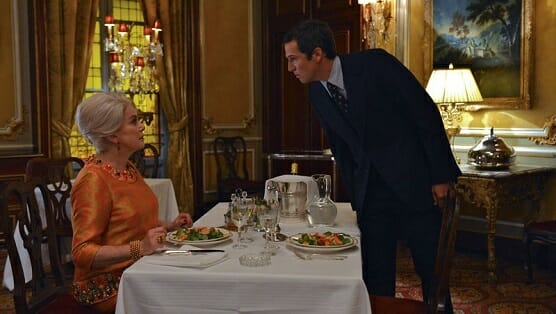
While it’s generally a pleasure watching Catherine Deneuve, the grande dame of French cinema, sometimes the material just isn’t quite up to snuff for the star of such screen classics as The Umbrellas of Cherbourg or Belle de Jour. Such is the case with Deneuve’s latest film, In the Name of My Daughter, her seventh collaboration with veteran director André Téchiné (The Girl on the Train, My Favorite Season). Based on a true-crime story that involves a casino war on the French Riviera, the mafia and an heiress’s disappearance, the film is surprisingly devoid of thrills and an emotional connection among the characters.
Debuting out of competition at last year’s Cannes Film Festival, In the Name of My Daughter is based on the memoirs of Renée Le Roux, the owner of the Palais de la Méditerranée casino in Nice, France. Deneuve plays Renée, who’s barely holding onto the casino in 1976 after the house suffers huge losses in a fixed card game and the mafia increases pressure to sell. When daughter Agnès (Adèle Haenel) returns from Africa after a failed marriage, she adds to Renée’s troubles by demanding her inheritance, which is tied to the casino. Mother and daughter have a long-strained relationship, but Téchiné, also one of the film’s screenwriters, fails to explore the rift. We learn that Renée forced her daughter to take ballet lessons as a child, and Agnès was never able to dance en pointe, but that seems a minor reason for the major chasm between the women.
Things get even more complicated when Agnès falls for her mother’s lawyer and advisor Maurice Agnelet (Tell No One director Guillaume Canet). Maurice has lofty career aspirations with a tendency to manipulate people and situations to his favor. Although Maurice warns Agnès that he has a wife, son and other mistresses whom he has no intention of giving up, the willful and free-spirited girl still dives headfirst into the affair. When Renée denies him a promotion, Maurice influences the eventual outcome of casino ownership through his relationship with Agnès.
The betrayal of her mother and Maurice’s subsequent detachment pushes an already fragile Agnès into depression. After Agnès disappears and Maurice emigrates—or absconds—to Panama with her money (which all happens offscreen), In the Name of My Daughter fast-forwards 30 years with Renée on a mission to see Maurice convicted of murder. The film rushes through this final act to end on an odd note. Like Morten Tyldum’s The Imitation Game, Téchiné serves up some of the most interesting parts of the true story as a text epilogue. Don’t blink or you might miss the cards that reveal what happened to the key players.
Considering that the first two-thirds of the film is dedicated to a power struggle between the three characters, not much happens onscreen. Even an attack by the mafia on Renée, in which she’s knocked out cold, is only talked about and not seen. The relationship between the lovers doesn’t resonate either. Maurice, played cooly by Canet, is emotionally unavailable. Haenel’s Agnès seems like another spoiled and unstable heiress, who becomes despondent after the failed relationship. Whether the performances or the direction are ultimately at fault, the end result is the same: The lack of passion and chemistry between the two characters doesn’t give the audience a reason to invest in their (or the film’s) outcome.
Téchiné and cinematographer Julien Hirsch take great advantage of the French scenery, especially along the sea and in the countryside. There are a good number of aerial shots of Agnès and Maurice crossing dams and bridges on his motorcycle. Several handheld shots are noticeable and seem unnecessary considering the plot lacks the action to support the frenetic movement. Set designer Olivier Radot’s color palette works well on camera, with the extended ’70s flashback dripping in bright yellow and gold tones, contrasting the darker hues of the courtroom scenes.
Though we’re not sure of the era’s attire in France, the costumes lack the bell-bottoms, wide collars and flair that are customary American period pieces. Pascaline Chavanne’s choices are subtle, probably a wise choice considering some of the decade’s fashion. What’s not as forgivable is the makeup on the characters, especially on the older Maurice and his former mistress Françoise (Judith Chemla) during the film’s last act. They’ve aged 30 years, and their “disguises” are much too noticeable.
Téchiné has said he wanted to adhere to the narrative in Le Roux’s memoirs, but in a seeming contradiction, he also made it clear to the family that the film wouldn’t take a side in the murder story. We wish that he had: In the Name of My Daughter lacks the dramatic tension and could have used a little more bite.
Director: André Téchiné
Writers: André Téchiné, Jean-Charles Le Roux, Cédric Anger, based on Renée Le Roux’s memoirs, Une femme face à la mafia (A Woman Up Against the Mafia) co-written by her son Jean-Charles Le Roux
Starring: Guillaume Canet, Catherine Deneuve, Adèle Haenel, Jean Corso, Judith Chemla
Release Date: May 15 in L.A. and New York. In French with English subtitles.
Christine N. Ziemba is a Los Angeles-based freelance pop culture writer and regular contributor to Paste. You can follow her on Twitter.